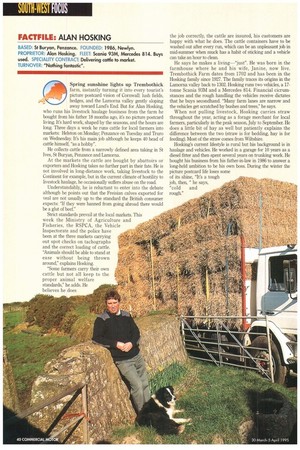Spring sunshine lights up Trembothick farm, instantly turning it into
Page 42

If you've noticed an error in this article please click here to report it so we can fix it.
every tourist's picture postcard vision of Cornwall: lush fields, hedges, and the Lamorna valley gently sloping away toward Land's End. But for Alan Hosking, who runs his livestock haulage business from the farm he bought from his father 18 months ago, it's no picture postcard living. It's hard work, shaped by the seasons, and the hours are long. Three days a week he runs cattle for local farmers into markets: Helston on Monday; Penzance on Tuesday and Truro on Wednesday. It's his main job although he keeps 40 head of cattle himself, "as a hobby".
He collects cattle from a narrowly defined area taking in St Ives, St Buryan, Penzance and Lamorna.
At the markets the cattle are bought by abattoirs or exporters and Hosking takes no further part in their fate. He is not involved in long-distance work, taking livestock to the Continent for example, but in the current climate of hostility to livestock haulage, he occasionally suffers abuse on the road.
Understandably, he is reluctant to enter into the debate although he points out that the Freisian calves exported for veal are not usually up to the standard the British consumer expects; "If they were banned from going abroad there would be a glut of beef."
Strict standards prevail at the local markets. This week the Ministry of Agriculture and Fisheries, the RSPCA, the Vehicle Inspectorate and the police have been at the three markets carrying out spot checks on tachographs and the correct loading of cattle. "Animals should be able to stand at ease without being thrown around," explains Hosking.
"Some farmers carry their own cattle but not all keep to the proper animal welfare standards," he adds. He believes he does the job correctly, the cattle are insured, his customers are happy with what he does. The cattle containers have to be washed out after every run, which can be an unpleasant job in mid-summer when muck has a habit of sticking and a vehicle can take an hour to clean.
He says he makes a living—"just". He was born in the farmhouse where he and his wife, Janine, now live. Trembothick Farm dates from 1702 and has been in the Hosking family since 1927. The family traces its origins in the Lamorna valley back to 1302. Hosking runs two vehicles, a 17tonne Scania 93M and a Mercedes 814. Financial cicrumstances and the rough handling the vehicles receive dictates that he buys secondhand. "Many farm lanes are narrow and the vehicles get scratched by bushes and trees," he says.
When not pulling livestock, Hosking carries straw throughout the year, acting as a forage merchant for local farmers, particularly in the peak season, July to September. He does a little bit of hay as well but patiently explains the difference between the two (straw is for bedding, hay is for feeding). Most of the straw comes from Wiltshire.
Hosking's current lifestyle is rural but his background is in haulage and vehicles. He worked in a garage for 10 years as a diesel fitter and then spent several years on trunking work. He bought his business from his father-in-law in 1986 to answer a long-held ambition to be his own boss. During the winter the picture postcard life loses some of its shine, "It's a tough job, then, "he says, "cold and rough."
































































































